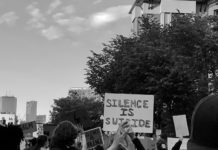Bridging Critical and Conceptual Psychiatry: An Interview with Awais Aftab
MIA’s Justin Karter interviews psychiatrist Awais Aftab about how “conceptual competence” uses philosophy to transform psychiatry.
Snakes and Ladders: How Psychiatry Took Away My Choices
The psychiatric system takes away all choices and freedom and calls the resulting state "mental illness." Psychiatry justifies alienation rather than repairing it.
Voicehearing, Reinaldo, and My Work as The Writer
The Writer has outlined a significant work through my hands, dictated by the voice of someone who lived at some point a long time ago, such as London in 1682 A.D.
The Year I Lost Everything, Psychiatry Offered Nothing
After a failed suicide attempt following my son's death, New York State incarcerated me in a mental institution for 21 days. The environment was degrading, stultifying, and downright depressing.
Youth Antidepressant Use Associated With Increased Suicide and Self-Harm
National data on rates of youth antidepressant prescription, suicide, and self-harm in Australia sparks public health debate about drug safety.
Suicide & Candy Corn: The Utility and Challenges of Risk Assessments
Researchers admit their suicide risk assessments work only about as well as random guessing, and they can lead to harm. We can instead focus on finding new ways to form connections that might help tether someone to this world.
Kerry O’Malley: A Personal Struggle Against Forced Medication
Neglect for personal autonomy is a pervasive attitude in the mental health system. No human being should be stripped of their dignity and autonomy, much less a vulnerable 74-year-old woman.
Instrument of the Machine No More
Early in my social work career, I truly believed that medication and forced confinement helped heal “mental illness.” Then an abrupt awakening completely altered my worldview.
Is It Time to Rethink Mental Illness in Light of the Pandemic?
Now that so many are experiencing distress because of the coronavirus, can we not appreciate that many who have been labeled mentally ill have long experienced these kinds of hardships?
Defunding the Police: Replacing Guns With Prescription Pads Is Not the Answer
Mental health workers responding to emergency calls and crises results in coercion, labelling and othering, paternalism, force, and, yes, even violence, all under the guise of “for your own good.”
Study Finds SSRIs Associated with Increased Risk for Violent Crime
Study finds an apparent connection between SSRIs, the most commonly prescribed type of antidepressant, and increased risk of violent crime.
JAMA Psychiatry Retracts Antidepressant Study
Once an appropriate statistical method was used, the study findings were “no longer valid,” according to the editors of JAMA and JAMA Psychiatry.
Does Stranger Mean Danger?
Are those diagnosed with “mental illness” more dangerous than other people? Or have we evolved to sense danger from anything that we believe to be different or "strange"?
Stop Saying This: Phrases That Sound Helpful, But Are Actually Gaslighting, Part 1
Therapists seem to have a reference book where they go to find phrases that sound really helpful but are actually gaslighting and self-serving.
John Read and Irving Kirsch – Electroconvulsive Therapy (ECT) Does the Evidence From Clinical...
An interview with John Read and Irving Kirsch to discuss their paper which calls to prohibit ECT. This is because the negative effects of ECT are so strong, the evidence supporting it is so weak (especially in the long-term and beyond the improvement due to placebo) and there are other means of addressing the difficulties that the person is struggling with.
Black Suicidality and Mental Health #BlackLivesMatter
Suicides in Black communities can be understood to be caused by an institutionalized inequality that requires Black folks to negotiate their quality of life with life itself.
End Police “Wellness Checks.” Now.
If you are a mental health worker or advocate, there's a way to help dismantle police brutality and systemic racism in the U.S.
Exercise for Youth Mental Health in the Lockdown: Interview with Psychologist Scott Greenspan
School Psychologist Scott Greenspan discusses how to promote exercise and mental wellbeing for adolescents stuck indoors during the pandemic.
We Must Not Be Silent On George Floyd & Systemic Racism.
Dear Mad in America community: How much have we grown? Can we join together in working toward our liberation, bound together as activists?
Withdrawing Kids from Psych Drugs: Why, How, and When
Here are methods for reducing or eliminating a child's psychiatric medications that I have seen work well over years of supporting families through this process.
Recovery: Stressing the Social Basis of the Process
Recovery involves engaging in new material and social contexts and in open dialogues where new ways of understanding and handling the situation are created.
Canadian Mental Health Legislation and the CRPD
Psychiatric survivors in Canada tell the UN that Canada is not complying with the United Nations Convention on the Rights of Persons with Disabilities (CRPD).
Supporting Children and Parents to Withdraw from Psychiatric Medication
The main problem with prescribing psychiatric drugs to children is that it hasn’t been very effective.
Drugs? Thank You, I’ll Pass
If I ever lose my mind again, I hope that psychiatrists in charge of my care will grant me but one wish. Please do not force me to take drugs that fill me full of fear.
Review Documents Severe Withdrawal Effects of Psychiatric Drugs
Researchers find that most psychiatric drugs cause severe withdrawal despite attempt s to gradually decrease the dosage.

































